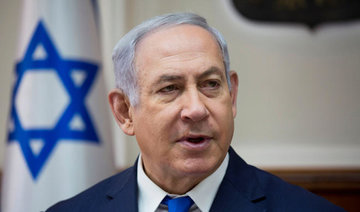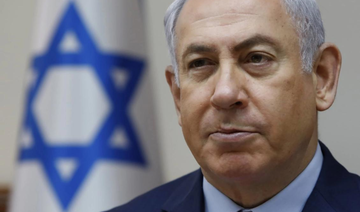JERUSALEM: Israeli police on Sunday questioned a close ally of Prime Minister Benjamin Netanyahu on corruption charges dating to his pre-Parliament days as he was pushing for pro-Netanyahu legislation widely seen as stifling police investigations.
Coalition whip David Bitan was grilled in relation to accusations that he promoted the interests of criminals in return for debt relief while he was a municipal politician years ago.
Bitan is the driving force behind a legislation push seen as aiding the beleaguered Netanyahu, who faces multiple corruption accusations. Bitan’s so-called “recommendations bill” would end the police’s current practice of recommending to the state prosecution office whether to indict suspects upon completing their investigations.
It also aims to stem leaks from the investigations themselves, stating that no police recommendations be made public and penalizing those found leaking to the media.
Netanyahu’s Likud party was set to bring the bill for a parliamentary vote on Monday, but appears to be short on numbers and will likely delay it. Their hope is to move the bill forward quickly so that it will also apply to investigations currently taking place regarding Netanyahu.
Netanyahu has been questioned in two cases and police say they suspect him of being involved in bribery, fraud and breach of trust. Police have already grilled him six times regarding gifts he received from Hollywood and business figures, and in another probe about secret talks with the publisher of a major Israeli newspaper in which Netanyahu allegedly requested positive coverage in exchange for reining in a free pro-Netanyahu daily. One of his closest former aides has become a state’s witness against him.
Netanyahu has repeatedly denied any wrongdoing and calls the accusations a witch hunt orchestrated by a hostile media.
Another investigation has engulfed his close associates and dominated news in Israel. The probe relates to a possible conflict of interest involving a $2 billion purchase of German submarines.
Netanyahu’s personal attorney, who is also his cousin, represented the German firm involved and is suspected of trading his influence over the prime minister in return for a hefty cut of the deal. A former Cabinet minister and top former navy and security officials have been questioned by police. Netanyahu has yet to be named a suspect in that probe.
Bitan’s questioning comes a day after tens of thousands of Israelis poured into the streets of Tel Aviv Saturday night for an anti-corruption rally calling on Netanyahu to resign. It was one of the largest demonstrations yet against Netanyahu’s lengthy rule.
“I think the time has come to change the government. The government is corrupt. We’re sick of the corrupt,” said a protester.
Israeli PM’s ally questioned over corruption charges
Israeli PM’s ally questioned over corruption charges

Israel military says sirens sounded in several areas in central Israel following projectile launched from Yemen

CAIRO: The Israel military said in a statement early on Tuesday that sirens sounded in several areas in central Israel following a projectile launched from Yemen.
Iraq says to eliminate pollutant gas flaring by end of 2027

- The office of Iraqi Prime Minister Mohammed Shia Al-Sudani in a statement Monday evening pointed to “a rise in the level of eliminating gas flaring” in the country
BAGHDAD: Iraqi authorities on Monday announced that the energy-rich country would eliminate the polluting practice of gas flaring by the end of 2027, a statement from the prime minister’s office said.
Gas flaring during the production or processing of crude is intended to convert excess methane to carbon dioxide, but the process is often incomplete, resulting in further methane release.
Iraq has the third highest global rate of gas flaring, after Russia and Iran, having flared about 18 billion cubic meters of gas in 2023, according to the World Bank.
The office of Iraqi Prime Minister Mohammed Shia Al-Sudani in a statement Monday evening pointed to “a rise in the level of eliminating gas flaring” in the country.
The office said that the current rate of elimination stood at 67 percent, with the aim of raising that rate to 80 percent by the end of 2025.
It added that the country aims to fully eliminate gas flaring by the end of 2027, compared to the previous administration’s target of 2030.
In 2017, Iraq joined a World Bank-led initiative aiming to end gas flaring globally by 2030.
Gas flaring is cheaper than capturing the associated gas, processing and marketing it.
In an April report, Greenpeace Middle East and North Africa said gas flaring “produces a number of cancer-linked pollutants including benzene.”
Iraq is considered by the United Nations to be one of the five countries most vulnerable to some impacts of climate change.
In recent years, it has suffered increasingly from droughts and further desertification, with the country gripped by dust storms much of the year.
Defense minister acknowledges Israel killed Hamas leader in Iran

- The comments by Israel Katz appeared to mark the first time that Israel has admitted killing Ismail Haniyeh
- Katz said the Houthis leadership would meet a similar fate to that of Haniyeh
JERUSALEM: Israel’s defense minister has confirmed that Israel assassinated Hamas’ top leader last summer and is threatening to take similar action against the leadership of the Houthi group in Yemen.
The comments by Israel Katz appeared to mark the first time that Israel has admitted killing Ismail Haniyeh, who died in an explosion in Iran in July.
Israel was widely believed to be behind the blast, and leaders have previously hinted at its involvement.
In a speech Monday, Katz said the Houthis would meet a similar fate as the other members of an Iranian-led alliance in the region, including Haniyeh.
He also noted that Israel has killed other leaders of Hamas and Hezbollah, helped topple Syria’s Bashar Assad, and destroyed Iran’s anti-aircraft systems.
“We will strike (the Houthis’) strategic infrastructure and cut off the head of the leadership,” he said.
“Just like we did to Haniyeh, Sinwar, and Nasrallah in Tehran, Gaza, and Lebanon, we will do in Hodeida and Sanaa,” he said, referring to Hamas and Hezbollah leaders killed in previous Israeli attacks.
The Iranian-backed Houthis have launched scores of missiles and drones at Israel throughout the war, including a missile that landed in Tel Aviv on Saturday and wounded at least 16 people.
Israel has carried out three sets of airstrikes in Yemen during the war and vowed to step up the pressure on the militant group until the missile attacks stop.
New conflict in northeast Syria could bring ‘dramatic consequences’, UN envoy says

- Turkiye regards the YPG as an extension of the Kurdistan Workers Party (PKK) militants who have fought an insurgency against the Turkish state and are deemed terrorists by Ankara, Washington and the European Union
BEIRUT: Tensions in northeast Syria between Kurdish-led authorities and Turkish-backed groups should be resolved politically or risk “dramatic consequences” for all of Syria, the United Nations envoy for the country Geir Pedersen told Reuters on Monday. Hostilities have escalated between Syrian rebels backed by Ankara and the US-backed Syrian Democratic Forces in the northeast since Bashar Assad was toppled on Dec. 8.
Syrian armed groups seized the city of Manbij from the SDF on Dec. 9 and could be preparing to attack the key city of Kobani, or Ayn Al-Arab, on the northern border with Turkiye.
“If the situation in the northeast is not handled correctly, it could be a very bad omen for the whole of Syria,” Pedersen said by phone, adding that “if we fail here, it would have dramatic consequences when it comes to new displacement.” The SDF — which is spearheaded by the Kurdish YPG — has proposed to withdraw its forces from the area in exchange for a complete truce. But Turkiye’s Foreign Minister Hakan Fidan, speaking alongside Syria’s de facto new leader Ahmed Al-Sharaa on Sunday in Damascus, said the YPG should disband totally.
Turkiye regards the YPG as an extension of the Kurdistan Workers Party (PKK) militants who have fought an insurgency against the Turkish state and are deemed terrorists by Ankara, Washington and the European Union.
Pedersen said a political solution “would require serious, serious compromises” and should be part of the “transitional phase” led by Syria’s new authorities in Damascus. Fidan said he had discussed the YPG presence with the new Syrian administration and believed Damascus would take steps to ensure Syria’s territorial integrity and sovereignty. Turkish President Tayyip Erdogan said on Monday the country will remain in close dialogue with Sharaa. Kurdish groups have had autonomy across much of the northeast since Syria’s war began in 2011, but now fear it could be wiped out by the country’s new Islamist rule. Thousands of women rallied on Monday in a northeast city to condemn Turkiye and demand their rights be respected.
Pedersen said Sharaa had told him in meetings in Damascus last week that they were committed to “transitional arrangements that will be inclusive of all.”
But he said resolving tensions in the northeast would be a test for a new Syria after more than a half-century of Assad family rule.
“The whole question of creating a new, free Syria would be off to a very, extremely ... to put it diplomatically, difficult start,” he said.
Rights groups say evidence of Assad abuses must be protected

- The Saydnaya complex, the site of extrajudicial executions, torture and forced disappearances, epitomised the atrocities committed against Assad’s opponents
BEIRUT, Lebanon: Three rights group on Monday appealed to Syria’s new rulers to urgently preserve evidence of atrocities committed under former president Bashar Assad.
Such evidence — including government and intelligence documents as well as mass graves — will be essential for establishing the fate of tens of thousands of people forcibly disappeared, and for prosecuting those responsible for crimes under international law, the groups said.
“The transitional Syrian authorities should urgently take steps to secure and preserve evidence of atrocities committed under the government of former president Bashar Assad,” said Amnesty International, Human Rights Watch and the Association of Detainees and Missing Persons in Sednaya Prison (ADMSP).
The Saydnaya complex, the site of extrajudicial executions, torture and forced disappearances, epitomised the atrocities committed against Assad’s opponents.
“Every additional minute of inaction heightens the risk that a family may never discover the fate of their missing loved one, and an official responsible for horrific crimes may never be brought to justice,” Shadi Haroun, ADMSP program manager, said in a statement issued by Amnesty.
The statement said investigators from the three organizations visited detention facilities, mass graves and the military court after Islamist-led rebels toppled Assad on December 8.
“In all of the detention facilities visited, researchers observed that official documents were often left unprotected, with significant portions looted or destroyed,” the groups said.
They said they gathered testimony that security and intelligence personnel burned some material before they fled, but in other cases the armed groups who took control of the facilities, or newly-freed prisoners, also burned and looted material.
The researchers said they themselves saw ordinary people and some journalists “take some documents.”
“These documents may contain vital information,” the watchdogs said, calling on the new authorities to coordinate with fact-finding bodies created by the United Nations, “after urgently securing these locations and ensuring that the remaining evidence is not tampered with.”
The rights groups said they also underscored to Syria’s new authorities “the importance of securing the sites of the mass graves across the country,” having seen “local residents and families of the disappeared try to dig up some of the remains.”
They said officials from Syria’s new administration had promised the visiting researchers that they would “strengthen security around key facilities.”
On Sunday Robert Petit, the visiting head of a UN investigative body for Syria, said it was possible to find “more than enough” evidence to convict people of crimes under international law, but there was an immediate need to secure and preserve it.





















